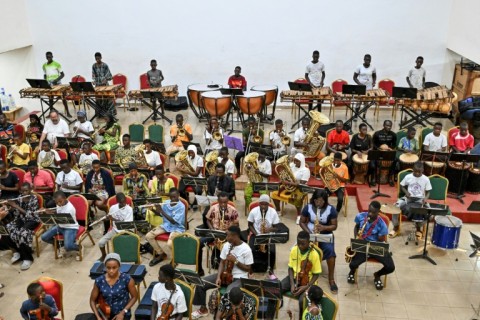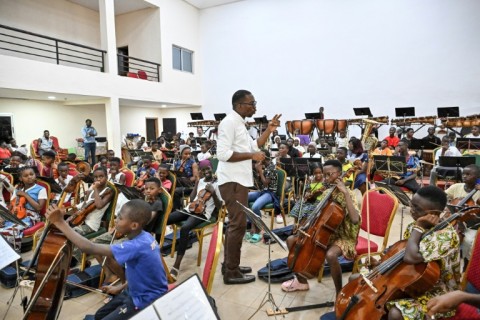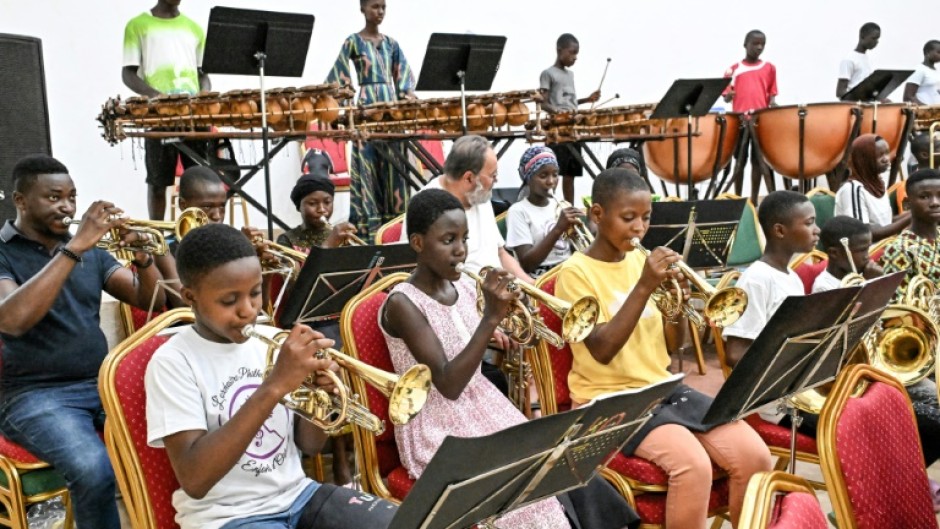ODIENNE - In the hubbub of children's chatter, nine-year-old Leila Coulibaly deftly tunes her violin ahead of a rehearsal by Ivory Coast's first philharmonic orchestra.
She is among almost 140 children who make up the ensemble based in the rural northern town of Odienne.
They gather as an orchestra once a week but every day some youngsters, aged six to 16, are picked up by minibus and brought to a hotel.
There, they practise for over two hours incorporating traditional instruments like the balafon, a type of xylophone, and djembe drums.
"I want to be a professional musician because the orchestra changed my life," Leila told AFP.
Hundreds of kilometres away from the bustling metropolis of Abidjan, Odienne relies heavily on agriculture, sometimes involving child labour.
Poverty and high unemployment make the future uncertain for many young people in Ivory Coast.
The Odienne orchestra is somewhat of a "crazy project" in a region like this, conductor Fabrice Koffi said, laughing.
- 'Regained self-confidence' -
In temperatures of 35 degrees Celsius, 15-year-old trombonist Siaka Sy Savane sits behind the shady stalls of a market.

From dawn "Monday to Friday, I come to help my mother at the market. Saturday and Sunday, I go with my big brother to the field," he said.
"When I sing the music of the orchestra, I don't feel tired anymore, it motivates me.
"Ever since I was young, I dreamed of being a musician," he said, adding: "Today, my dream has come true."
Last August, less than a year after the orchestra was created, the children played for Ivorian President Alassane Ouattara on the anniversary of independence from France in 1960.
Despite playing the odd wrong note, they play with ease Mozart's "March of the Priests" from "The Magic Flute" or the "Coup du Marteau", which became a hit during the 2024 Africa Cup of Nations.
The song by musician Tam Sir was performed by the orchestra at the closing ceremony of the football competition, which Ivory Coast won.
"I enjoyed playing in front of all of those people. I was really scared" but "I regained my self-confidence", violinist Leila said.
- Theory of music -
The youth development programme is inspired by Venezuelan initiative El Sistema, which teaches music to children from disadvantaged backgrounds.
In the West African nation, the orchestra was set up by Minister for Employment and Social Protection Adama Kamara, who is personally funding it.

Koffi has watched over every student since the very first rehearsal.
"We are doing the opposite of what a traditional orchestra does," he said.
While an ensemble is usually a "gathering of the very best" musicians, the orchestra in Odienne has taught the children the basics, such as music theory and playing techniques.
Teaching is done collectively, "unlike an academy of music" which gives priority to private lessons, trumpet teacher Jean Caleb Kouadio said.
- Win over the parents -
The lessons have also been designed with sometimes conservative parents in mind, in a predominantly Muslim region.
"At first, the parents were downright reluctant," said Abdramane Doucoure, an intermediary between the families and the orchestra.
"Some people used to say that music doesn't go with Islam," he said.
Sarata Kante, a trumpeter in her early teens, had to convince her parents to let her play in the orchestra.
"She insisted for several weeks," her mother Mawa Keita said.
"It wasn't my ambition, my vision for her," said her father Ousmane Kante, fearing she would be too distracted.
"School is serious business," he added.
It is not a question of "taking children out of school" to become musicians, Koffi said.
He, too, had to stand up to his parents when he was younger in order to become a flautist.
"On the contrary, music" offers "the potential to excel at school", he added.
Sarata's grades in school have improved and she dreams of becoming a vet.
For viola teacher Deborah Bodo Israel, the orchestra and its achievements continue to amaze. "What's happening is magic," she said.
- by Marietou BÂ

